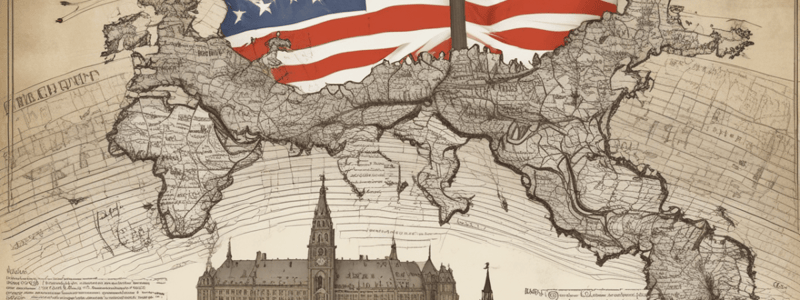Podcast
Questions and Answers
Who coined the phrase 'peace in our time'?
Who coined the phrase 'peace in our time'?
Neville Chamberlain
What was the Munich Agreement?
What was the Munich Agreement?
An agreement allowing Germany to annex the Sudetenland region of Czechoslovakia
What was the consequence of the Munich Agreement?
What was the consequence of the Munich Agreement?
The occupation of the rest of Czechoslovakia and the eventual outbreak of World War II
Why was the policy of appeasement criticized?
Why was the policy of appeasement criticized?
What does the phrase 'peace in our time' imply?
What does the phrase 'peace in our time' imply?
How is the phrase 'peace in our time' used today?
How is the phrase 'peace in our time' used today?
What was the event that led to the declaration of war by France and the United Kingdom?
What was the event that led to the declaration of war by France and the United Kingdom?
What is the phrase 'peace in our time' synonymous with?
What is the phrase 'peace in our time' synonymous with?
When was the phrase 'peace in our time' coined?
When was the phrase 'peace in our time' coined?
Flashcards
Peace in our time
Peace in our time
A phrase coined by British Prime Minister Neville Chamberlain in 1938, referring to his policy of appeasement towards Nazi Germany, implying a temporary or short-term peace rather than a long-lasting one.
Appeasement
Appeasement
A policy of giving in to the demands of an aggressor in order to avoid conflict.
Munich Agreement
Munich Agreement
An agreement signed in 1938, where Britain, France, and Italy allowed Germany to annex the Sudetenland region of Czechoslovakia.
Failure of Appeasement
Failure of Appeasement
Signup and view all the flashcards
Occupation of Czechoslovakia
Occupation of Czechoslovakia
Signup and view all the flashcards
Invasion of Poland
Invasion of Poland
Signup and view all the flashcards
World War II
World War II
Signup and view all the flashcards
Legacy of "Peace in our time"
Legacy of "Peace in our time"
Signup and view all the flashcards
Weak or Ineffective Policies
Weak or Ineffective Policies
Signup and view all the flashcards
Study Notes
Definition and Concept
- "Peace in our time" is a phrase coined by British Prime Minister Neville Chamberlain in 1938, referring to his policy of appeasement towards Nazi Germany.
- It implies a temporary or short-term peace, rather than a permanent or long-lasting one.
Historical Context
- The phrase was used in the context of the Munich Agreement, where Chamberlain, along with France and Italy, allowed Germany to annex the Sudetenland region of Czechoslovakia.
- The agreement was seen as a way to avoid war with Germany, but it ultimately failed to prevent the outbreak of World War II.
Criticism and Consequences
- The policy of appeasement was widely criticized for being naive and ineffective in stopping Nazi aggression.
- The phrase "peace in our time" has since become synonymous with failed diplomacy and a lack of resolve in the face of aggression.
- The consequences of the Munich Agreement included:
- The occupation of the rest of Czechoslovakia by Germany in 1939.
- The invasion of Poland by Germany in 1939, which led to the declaration of war by France and the United Kingdom.
- The eventual outbreak of World War II, which resulted in massive destruction and loss of life.
Legacy
- The phrase "peace in our time" has been used ironically or sarcastically to describe situations where a short-term solution is prioritized over a long-term resolution.
- It has also been used to criticize policies or decisions that are seen as weak or ineffective in the face of aggression or conflict.
Definition and Concept
- The phrase "peace in our time" refers to a temporary or short-term peace, rather than a permanent or long-lasting one, coined by British Prime Minister Neville Chamberlain in 1938.
- It implies a policy of appeasement towards Nazi Germany, prioritizing short-term peace over long-term resolution.
Historical Context
- The Munich Agreement (1938) allowed Germany to annex the Sudetenland region of Czechoslovakia, involving Chamberlain, France, and Italy.
- The agreement aimed to avoid war with Germany but ultimately failed to prevent the outbreak of World War II.
Criticism and Consequences
- The policy of appeasement was criticized for being naive and ineffective in stopping Nazi aggression.
- The Munich Agreement led to:
- Germany occupying the rest of Czechoslovakia in 1939.
- Germany invading Poland in 1939, prompting France and the United Kingdom to declare war.
- The eventual outbreak of World War II, resulting in massive destruction and loss of life.
Legacy
- The phrase "peace in our time" is now used ironically or sarcastically to describe short-term solutions prioritized over long-term resolutions.
- It is also used to criticize policies or decisions seen as weak or ineffective in the face of aggression or conflict.
Studying That Suits You
Use AI to generate personalized quizzes and flashcards to suit your learning preferences.





